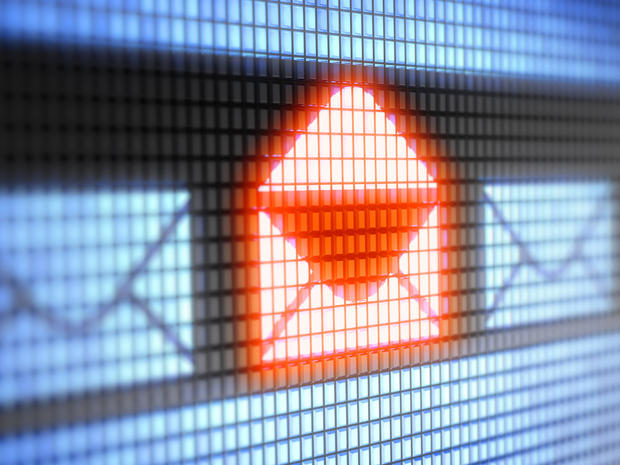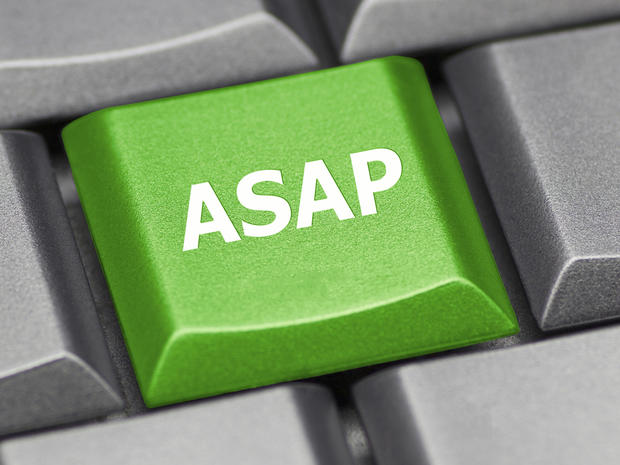5 annoying phrases to avoid when you send a work email
By Kathryn Tuggle/MainStreet.com
Most professionals get enough email in their inbox every day to make them want to scream -- there's no reason the content of those emails should also be infuriating.
Here's a look at the five most annoying (and infinitely avoidable) phrases often found in work emails.
ASAP
Using ASAP in an email puts pressure on the recipient to get things done "yesterday," psychologist Carole Lieberman says.
"It implies that you're lagging behind," she says. "Give people an actual deadline rather than just writing 'ASAP.'"
When you need something quickly, explain why.
"Rather than just trying to use your power over the person, tell them why this is important to you and enlist their help," she says. "Get them to feel as though they too want to get the ultimate result."
A similar phrase, "At your earliest convenience," is a little less jarring than ASAP but can also put undue pressure on the recipient.
"Again, explain why your goal matters and convey that you are on the same team, striving for the same speedy outcome," she says.
Seriously?
"Seriously?" is a serious wake-up call for the recipient, Lieberman says.
"It wakes people up, but it can seem too flippant and unprofessional. Even if it's appropriate in the sense that the recipient has overstepped some boundaries, it's inappropriate to use in business correspondence."
Lieberman says "Seriously?" is most commonly employed when someone feels they have not been heard or that they have had their boundaries or policies trampled. But when the word is used, it only takes the level of professional discourse down another notch.
"I will sometimes catch myself and think, 'Do you really want to make this person question your professionalism?' Instead you should say something like, 'I really don't agree with those plans. Here's why I don't agree. Can we talk about this before we take further action?'"
If you're in such disagreement via email that you're tempted to use "Seriously?" it's a sign it's time to escalate the conversation to the phone or an in-person meeting, she says.
FYI
"FYI can be very annoying, especially when used passive aggressively to forward an email from someone else: 'FYI, you should know about this.' If you want me to do something or know something, just tell me!" says Joe Weinlick, vice president of marketing at career network Beyond.com.
It's a matter of making the context clear, he says. If you forward an email with a simple "FYI" at the top, you're making the recipient scroll down to figure out what you're talking about.
"When I'm looking through my emails and I get an FYI, I have to take time to determine what the person wanted from me. What did they intend for me to do with this?" he says. "I have to read the email more closely and try to figure out context. This takes more time on my end."
When you forward a message with an FYI, make certain you forward it with some context in the initial message: "FYI, I thought you would be interested in this because ..."
"Ask yourself: What is the action required; what are you expecting this person to do?" Weinlick says.
Interesting
"Interesting" or any useless word used in a broadcast email
The worst kinds of emails add nothing to the conversation and come across as saying nothing more than "Look, I'm working!" Weinlick says.
"This happens a lot after hours. People jump on board replying-all to an email that starts at 11 p.m.," he says. "They reply with something useless like 'Interesting' or 'Good point,' and the only thing that says is: 'I just wanted to let people know I'm still awake, checking my email.'"
Before you send something like that, ask yourself: Why is it important for everyone to know this?
"If you're going to send an email -- especially to a group of people -- ask yourself, 'Is this something people need to know, or am I just trying to let them know that I know something?' Don't send emails because you want people to recognize you; send them because you have something important to say or to ask for," he says.
If you're commenting on an article that you found interesting, for example, offer some context as to why you liked it.
"Add a sentence or two of value to what you're saying. 'This was interesting because ...'" he says. "Even if you just pull one sentence out of the article and copy and paste it, it's better than just saying 'Interesting.'"
Good Morning
"Please don't yell 'Good morning' to me via email," Weinlick says. "Over-enthusiasm may be great for personal email, but for work emails, let's be polite and get to the point."
You have to consider your audience. Writing in all-capital letters is the Internet equivalent to shouting, he says. Using too many exclamation points is like laughing at your own joke.
"It's hard to show emotions in email," he says. "But don't go overboard."
When you reach out to someone and you want to send them a cheerful morning message, remember to keep things professional.
"If you don't know the person well and they see something like that, they're going to think, 'I don't know you. What do you want?' How would you greet them if you saw them in the hall? If you wouldn't yell 'GOOD MORNING!!!!' to them to their face, then don't put it in an email."
Yes, it's hard to convey nuances via email, but going overboard is always risky.
"You have to adapt your tone in email whether you're communicating with a client, your boss or a colleague," he says. "It's a little different with peer-to-peer communication, but you should still be careful. An email like that can be shocking ... and annoying."





